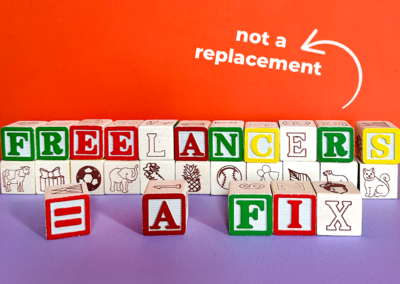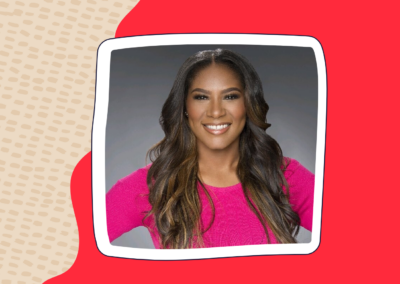Maintaining good relationships with your clients not only makes your work more enjoyable, but it also opens many doors in your freelance marketing career. You’ll likely be considered for future partnerships and projects, gain references, build your network, and develop a strong reputation. But as with anything in life, freelance work isn’t always smooth sailing. Even with your favorite clients and projects, you’ll probably encounter a tricky situation every once in a while.
We caught up with members of the Rosie community and our team of experts to find out which situations to look out for and how you can handle them like a pro.
1. The client’s needs increase mid-project, aka scope creep
You’ve committed to a project, done your due diligence, and outlined your scope of work, only to begin the project and suddenly be asked for more. Sound familiar?
Many freelancers experience scope creep, which can be particularly challenging when you’re juggling multiple clients and projects at once. Jocelyn Johnson, a creative director and Rosie who’s been building her freelance business over the past three years, knows this scenario well.
Jocelyn says that clients tend to rely on you more when you provide amazing work and good service. But no matter how flattering this is, it’s important to know your limits.
“I do my very best to accommodate client needs,” says Jocelyn. “But I can’t afford to do so at the expense of my own needs, and not when it jeopardizes another client agreement.”
While you want to go above and beyond for a good client and support them through changes, you also need to get paid for your work—all of it. This makes scope creep a particularly important issue to address if you’re on a flat-fee engagement.
Marie Lamonica, managing director of creative strategy at We Are Rosie, suggests “checking in and having an open dialogue with the client.” Sometimes they may not realize that they’ve been asking for more, so sit down with them and outline where the scope or time creep is happening. This way, moving forward, they can help make changes for a better partnership.
In these conversations, remember that there’s always a level of professionalism to uphold with your clients, even if the relationship is casual and friendly. (Side note: Marie says that if you’ve been working with a client for less than 18 months, you should consider it a new partnership and approach it as such.)
2. Paused or canceled projects that affect your work and income
Depending on your marketing specialty, your projects may require multiple phases of work and a lot of collaboration with your clients.
We Are Rosie’s creative and content strategy lead, Briana Palma, has taken on freelance assignments like this in the past—and seen them go awry when the client isn’t able to hold up their end of the bargain.
Mid-way through one big project, she discovered that her client didn’t have the team in place to complete their part of the work. What was originally supposed to be a two-week-long phase turned into months of waiting and not being paid.
When partnering directly with companies (especially under-resourced small businesses), you can set up your work to avoid this pitfall. On projects with multiple phases, Briana suggests separating each section as a different payment due. Whenever you complete a new deliverable, you’ll get paid for it and won’t be left in limbo.
Long-time copywriter Rod Moore has also experienced this and shares how he now prepares for it: “One piece of advice I’d offer to freelancers is to ‘get it in writing’” with a signed contract, he says. Rod points out that “kill fees are notoriously difficult to collect,” so he recommends “getting at least half of the project pay up-front.” This way, if the project falls through or stalls, you’ve already been paid. Plus, it’s easier to issue a refund than it is to collect payment.
3. Personal obligations that prevent you from completing a project
At We Are Rosie, we always support work-life balance. But what should you do when the scales suddenly tip and life requires more of your time, energy, and attention?
With a full-time job, you could take PTO or go on leave, but when you’re an entrepreneur, it isn’t as easy as putting up an OOO message and asking your coworkers to cover for you.
And sometimes, it means missing out on a dream project, disappointing yourself, and risking the disappointment of a client too.
In Jocelyn’s experience, she learned the importance of prioritizing her health and wellness in what she felt was the perfect project. “I started on a great short-term project . . . a dream project,” she tells us. “It checked all my boxes. It was perfectly aligned with my values and skills, would look great for my portfolio and resume, the money was ideal, and the duration worked well with my booking schedule.”
She got sick a week into the project, but as the only designer on the team, she wanted to keep going. “I’m used to powering through,” she says. “I wanted so badly to finish the project strongly and didn’t want to disappoint the client or derail the team.”
However, what she originally thought was a stomach bug turned out to be much worse, requiring emergency surgery and recovery time.
“I provided health updates as best I could, grateful that everyone understood my situation,” she explains. Her constant and honest communication helped preserve the client relationship and brought them back for future projects.
Jocelyn’s approach is exactly what Marie would recommend to any freelancer in this situation: communicate what’s going on (you don’t have to go into details about your health) and how it will potentially impact the work. Give your client specific updates if you can, like explaining, “I will miss this deadline by X amount of time.” When you can’t, have a trusted family member or friend contact the client for you.
And don’t be shy about tapping into your network! If you have peers who can cover for you, consider making an introduction or passing their contact information onto the client.
4. You want to change your rates with existing clients
When you begin freelancing, one of the biggest questions is, “How much should I charge?”
As a rule of thumb, you should only accept projects at a rate you’re comfortable with, regardless of comparison to others. But if you discover that your initial rate is lower than peers are charging, or that it doesn’t accurately reflect the work you end up taking on, what can you do?
Hope-Elizabeth Sonam, head of community at We Are Rosie, recommends doing your homework (and some market research) before requesting a higher pay rate: compare the scope of work with peers who are charging more to make sure they’re similar and that your increase would be justified.
It might be difficult to change your rates with existing clients, but when you do, be sure you make adjustments based on the work and value you provide. Hope proposes that “if you notice your client has increased your workload recently or asked for things outside of your agreement, consider increasing your rate since you’re delivering more work.” Feeling adequately valued and compensated is foundational to producing your best work.
If you’re hired by We Are Rosie or another freelance community, remember that you’ll start there. If you’re a Rosie, our team can help you strategize a plan for increasing your rate and will advocate for you with the client. If you’re directly employed by your client and your research points to a pay raise, a conversation with your hiring manager or HR is in order.
“It’s often times easier to negotiate a pay rate increase at the end of a contract term when the freelancer is up for extension, so sometimes a little bit of patience will be required,” Hope explains. “But you should always be advocating for yourself!”
When in doubt, lean on your network
Any relationship comes with challenges, and those in the professional realm are no different. The good news is that you’re not alone. If you’re a member of the Rosie community, you’ve got a whole network of peers and our team of industry experts to help you maintain happy and productive relationships with your clients.
If you’re not a Rosie yet, sign up for free today and ask all your questions in our Slack community!



